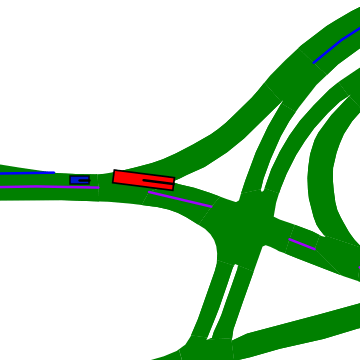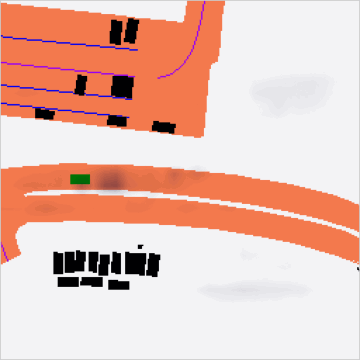Transcendental Idealism of Planner:
Evaluating Perception from Planning Perspective for Autonomous Driving
The Fortieth International Conference on Machine Learning (ICML 2023)
Wei-Xin Li, Xiaodong Yang
[Paper][Poster]
- This repository contains an example application of our work (which is originally designed for module-based planners) for a neural planner.
- The dynamic range of the TIP score depends on that of the utility function. In this exemplar implementation, the probability density map on a discrete grid is used in lieu of the utility function for the neural planner, thus the TIP score ranges between [-2, 0]. More context is available in the paper.
- This example implementeation is built on the nuscenes-devkit library, and is adapted from the implementation of Planner-KL Divergence (PKL), both of which use the Apache 2.0 License.
Download nuScenes data and maps from https://www.nuscenes.org/. We assume that nuScenes is located at NUSCENES_ROOT and nuScenes maps are located at NUSCENES_MAP_ROOT.
Install dependencies.
pip install nuscenes-devkit tensorboardY planning-centric-metrics
If neccesary, follow the full tutorial of PKL to visulise the data, and train the neural planner (including the masks file).
Install this ti-planner package.
pip install -e .
Score a nuScenes detection submission on an eval set. Set --gpuid=-1 to use the CPU.
python main.py eval_test VERSION EVAL_SET --result_path=SUBMISSION --dataroot=NUSCENES_ROOT --map_folder=NUSCENES_MAP_ROOT --model_path=MODEL_PATH --mask_json=MASK_PATH --output_dir=OUTPUT_DIR
For instance, one can score a synthetic submission where all detections are removed from the ground truth by running
python main.py eval_test mini mini_train --result_path='./example_submission.json' --nworkers=8 --dataroot=NUSCENES_ROOT --map_folder=NUSCENES_MAP_ROOT --plot_kextremes=5 --output_dir='./result' --model_path='./planner.pt' --mask_json='./masks_trainval.json'
with output results
./result/planner_metric_tip.json
./result/TIP_worst0000.png
./result/TIP_worst0001.png
./result/TIP_worst0002.png
./result/TIP_worst0003.png
./result/TIP_worst0004.png
and statistics printout
{'min': -0.16451147198677063, 'max': -0.00033551082015037537, 'mean': -0.051448892802000046, 'median': -0.02976861782371998, 'std': 0.052457597106695175, 'top_worst': {311: -0.16451147198677063, 316: -0.16401930153369904, 317: -0.16395069658756256, 319: -0.16393756866455078, 322: -0.16389690339565277}}
5 scenes with the lowest TIP scores under the trained planner are (the lower the TIP score is, the worse the error is)

Given the TIP scores produced from CBGS by the scoring functionality above, one can visualise the distribution of TIP scores by
python main.py eval_test trainval val --result_path=SCORE_JSON_PATH --nworkers=8 --dataroot=NUSCENES_ROOT --map_folder=NUSCENES_MAP_ROOT
python main.py score_distribution_plot trainval --score_result_path=SCORE_JSON_PATH --dataroot=NUSCENES_ROOT
To understand the impact of false negatives, one can visualise the significance of each ground-truth object by removing it from the correponding scene and computing the TIP.
python main.py false_neg_viz trainval --model_path=MODELPATH --dataroot=NUSCENES_ROOT --map_folder=NUSCENES_MAP_ROOT
Similarly, one can visualise the importance of correctly not predicting a false positive at each location in a grid around the ego.
python main.py false_pos_viz trainval --model_path=MODELPATH --dataroot=NUSCENES_ROOT --map_folder=NUSCENES_MAP_ROOT
If you found this codebase useful in your research or work, please consider citing
@InProceedings{Li_2023_ICML,
author = {Li, Wei-Xin and Yang, Xiaodong},
title = {Transcendental Idealism of Planner:
Evaluating Perception from Planning Perspective for Autonomous Driving},
booktitle = {International Conference on Machine Learning (ICML)},
year = {2023}
}
Copyright (C) 2023 QCraft. All rights reserved. Licensed under the CC BY-NC-SA 4.0 (Attribution-NonCommercial-ShareAlike 4.0 International). The code is released for academic research use only. For commercial use, please contact business@qcraft.ai.



